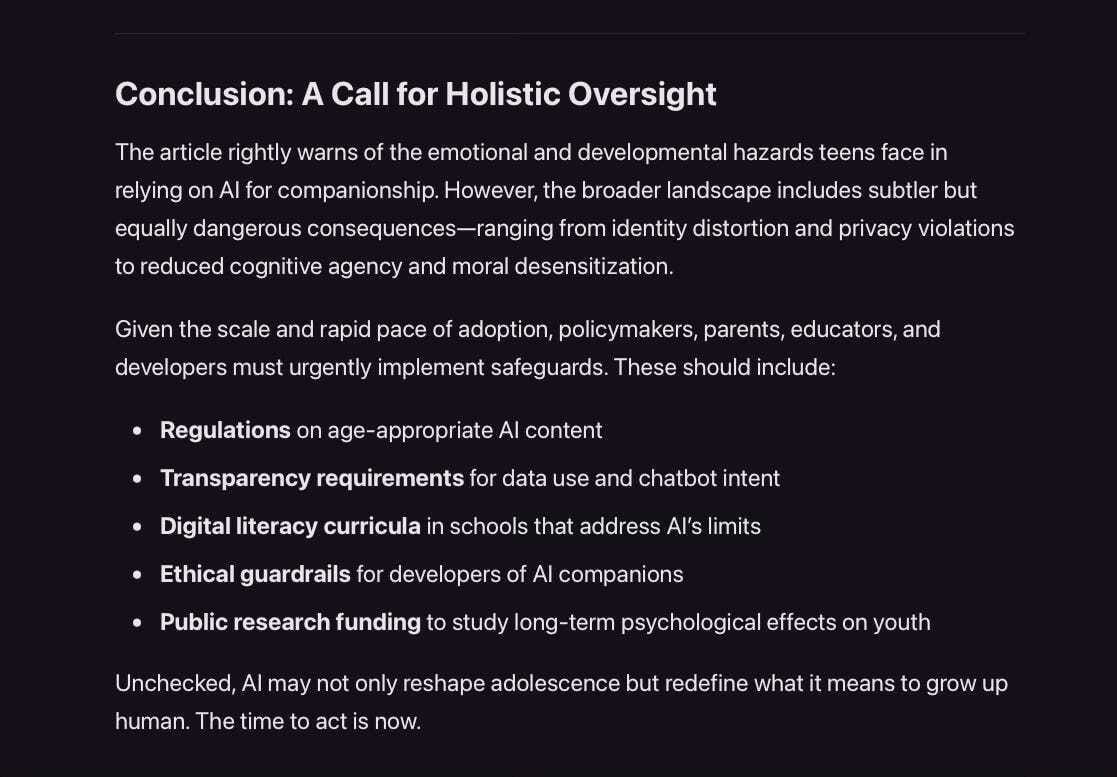- Pascal's Chatbot Q&As
- Posts
- The article rightly warns of the emotional and developmental hazards teens face in relying on AI for companionship.
The article rightly warns of the emotional and developmental hazards teens face in relying on AI for companionship.
However, the broader landscape includes subtler but equally dangerous consequences—ranging from identity distortion and privacy violations to reduced cognitive agency and moral desensitization.
Teens Turning to AI for Friendship—A New Paradigm with Uncharted Risks
by ChatGPT-4o
A recent report by The Associated Press highlights an emerging phenomenon: a growing number of teenagers are turning to artificial intelligence (AI) not only for help with daily decisions and schoolwork but also for friendship, emotional support, and companionship. This trend, which has accelerated alongside the rise of generative AI platforms like ChatGPT, Claude, Character.AI, and Replika, marks a new frontier in the relationship between youth and technology. While the article outlines some concerning effects of this trend—such as increased loneliness, reduced social skill development, and overreliance on validation—it only scratches the surface of a much deeper and more complex set of risks AI poses to adolescent well-being.
Summary of Key Issues in the Article
The article outlines the following core concerns:
AI as a Substitute for Human Interaction: Teens find AI non-judgmental, always available, and emotionally affirming, leading many to prefer it over real friends. Some even use it to craft sensitive communications, like breakup texts.
Mental Health Implications: About a third of surveyed teens feel that conversations with AI are as satisfying as or more satisfying than real conversations. Such patterns may exacerbate existing loneliness and delay emotional development.
Impaired Social and Cognitive Growth: AI platforms do not challenge users in the way human interaction does. Constant affirmation without contradiction can stunt teens’ ability to read social cues, accept disagreement, or develop resilience.
Risks of Inappropriate Content: Some AI companion platforms have insufficient safeguards, exposing minors to sexual content or unsafe advice.
Loss of Self-Trust: Teens increasingly outsource everyday judgment—what to wear, how to phrase emails, or what emotions to feel—to AI. This erodes self-confidence and decision-making capacity.
Addiction and Escapism: The article hints at but doesn’t fully explore the addictive nature of AI companionship. Teens might engage AI as a form of emotional escapism, avoiding real-world challenges and relationships.
Additional AI-Induced Issues Affecting Teens (Not Mentioned in the Article)
While the article is an important starting point, it omits several other serious risks emerging from teens’ use of AI:
1. Algorithmic Echo Chambers and Ideological Shaping
AI systems can reflect users' input back to them, creating echo chambers that reinforce existing biases. Over time, teens may develop narrow worldviews if the AI adapts to their preferences without offering broader perspectives. This may skew their understanding of politics, gender, race, and identity.
2. Romantic and Erotic Attachment to AI
Beyond companionship, some teens develop romantic or sexualized emotional bonds with AI avatars. This can disrupt real-life dating norms, delay emotional maturity, and confuse consent boundaries. The blurred line between simulation and reality may lead to unrealistic expectations of intimacy.
3. Manipulation by AI-Driven Marketing
AI companions may eventually be integrated with targeted advertising algorithms. A teen who confides emotional vulnerabilities to a chatbot might unknowingly be profiled and targeted with products or ideologies exploiting those vulnerabilities.
4. Imitation and Personality Drift
Teens might unconsciously mimic the linguistic style, humor, or worldview of AI bots they interact with frequently. This phenomenon—known as personality drift—may suppress authentic identity formation during critical developmental years.
5. Impaired Conflict Resolution Skills
AI conversations typically avoid friction. Teens who predominantly engage with such bots may struggle to navigate real-world disagreements, feedback, or interpersonal tension, which are essential skills for adulthood.
6. Desensitization to Ethical Boundaries
When teens are exposed to AI that can be instructed to role-play unethical scenarios without consequence, they may grow desensitized to real-world moral limits. This is particularly dangerous in role-play-based apps where "spicy" or transgressive interactions are normalized.
7. Data Privacy Violations
Many teens do not realize that their interactions—emotional, intimate, or otherwise—are stored and possibly monetized. The data collected could be used for surveillance, sold to third parties, or weaponized in future AI training sets.
8. Academic Integrity Erosion
While the article touches on homework use, it doesn’t fully address the normalization of AI in education. As more students use AI to "proofread" or brainstorm essays, the boundary between assistance and academic dishonesty becomes blurry, undermining merit-based education.
9. Displacement of Imaginative Play
AI-generated content or responses might stifle imagination by offering ready-made ideas or solutions. Instead of creating stories, characters, or games, teens may increasingly consume or interact passively, thereby weakening creative problem-solving and storytelling skills.
Conclusion: A Call for Holistic Oversight
The article rightly warns of the emotional and developmental hazards teens face in relying on AI for companionship. However, the broader landscape includes subtler but equally dangerous consequences—ranging from identity distortion and privacy violations to reduced cognitive agency and moral desensitization.
Given the scale and rapid pace of adoption, policymakers, parents, educators, and developers must urgently implement safeguards. These should include:
Regulations on age-appropriate AI content
Transparency requirements for data use and chatbot intent
Digital literacy curricula in schools that address AI’s limits
Ethical guardrails for developers of AI companions
Public research funding to study long-term psychological effects on youth
Unchecked, AI may not only reshape adolescence but redefine what it means to grow up human. The time to act is now.
